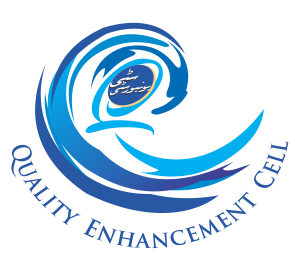Plagiarism
Plagiarism
In the wake of fundamental improvements being introduced in the system of Higher Education in Pakistan, the credit, respect, recognition of research and scholarly publications, career development and financial gains are now linked with such original works accomplished without replicating the efforts of other researchers. It has therefore become necessary that the menace of plagiarism is highlighted and curbed through exemplary punitive actions. On the other hand, we must also guard against bogus or false complaints in order to prevent victimization which may make researchers and scholars shy away from research simply because of the fear of prosecution. A Plagiarism Policy has therefore become necessary to create awareness, define various forms in which Plagiarism exhibits itself, present a methodology of investigation, cater for punitive action proportional to the extent of the offence and even address the issue of false or spurious complaints.
Definition: According to the Concise Oxford Dictionary, Plagiarism is defined as "taking and using the thoughts, writings, and inventions of another person as one's own". This, or various similar definitions found in recognized publications / documents, are very broad and can be used to create awareness about Plagiarism but are not practical enough to apply in order to ascertain guilt or innocence in specific cases. In order to establish the violation of ethical norms, or academic or intellectual dishonesty resulting from Plagiarism and to take punitive actions in this regard, it is necessary that the variety of forms in which Plagiarism manifests itself are known. These include but are not limited to the following:
Explanation from Wikipedia, the free encyclopedia Wikipedia, the free encyclopedia on the web describes and explains Plagiarism as "the unauthorized use or close imitation of the language and thoughts of another author and the representation of them as one's own original work. Unlike cases of forgery, in which the authenticity of the writing, document, or some other kind of object itself is in question, plagiarism is concerned with the issue of false attribution. Within academia, plagiarism by students, professors, or researchers is considered academic dishonesty or academic fraud and offenders are subject to academic censure. In journalism, plagiarism is considered a breach of journalistic ethics, and reporters caught plagiarizing typically face disciplinary measures ranging from suspension to termination. While plagiarism in scholarship and journalism has a centuries-old history, the development of the Internet, where articles appear as electronic text, has made the physical act of copying the work of others much easier. Plagiarism is different from copyright infringement. While both terms may apply to a particular act, they emphasize different aspects of the transgression. Copyright infringement is a violation of the rights of the copyright holder, which involves the loss of income and artistic control of the material when it is used without the copyright holder's consent. On the other hand, plagiarism is concerned with the unearned increment to the plagiarizing author's reputation. In the academic world, plagiarism by students is a very serious academic offense which can result in punishments such as a failing grade on the particular assignment (typically at the high school level), or a failing grade for the course (typically at the college or university level). For cases of repeated plagiarism, or for cases where a student has committed a severe type of plagiarism (e.g. copying an entire article and submitting it as his / her own work), a student may be suspended or expelled, and any academic degrees or awards may be revoked. For professors and researchers, who are required to act as role models for their students, plagiarism is a very serious offence, and is punishable by sanctions ranging from suspension to termination, along with the loss of credibility and integrity. Charges of plagiarism against students, faculty members and staff are typically heard by internal disciplinary committees, which students and faculty members have agreed to be bound by." Wikipedia also describes Self-plagiarism as "the re-use of significant, identical, or nearly identical portions of one’s own work without acknowledging that one is doing so or without citing the original work. Typically, high public-interest texts are not a subject of self-plagiarism; however, the authors should not violate copyright where applicable. "Public-interest texts" include such material as social, professional, and cultural opinions usually published in newspapers and magazines."
Aim: The aim of this policy is to apprise students, teachers, researchers and staff about Plagiarism and how it can be avoided. It is also aimed at discouraging Plagiarism by regulating and authorizing punitive actions against those found guilty of the act of Plagiarism.
Applicablity: The policy is applicable to students, teachers, researchers and staff of all institutions and organizations in Pakistan who are involved in writing or publishing their work. In this context a "Student" is a person who, on the date of submission of his / her paper / work is a registered student of any University or Degree Awarding Institution recognized by Higher Education Commission (HEC). Teachers and Researchers" include faculty members or equivalent of the University / Organization or/of a constituent or affiliated college or researchers of an organization and such other persons as may be declared to be so by regulations. “Staff” is any employee of an organization involved in writing and publishing his / her work.
